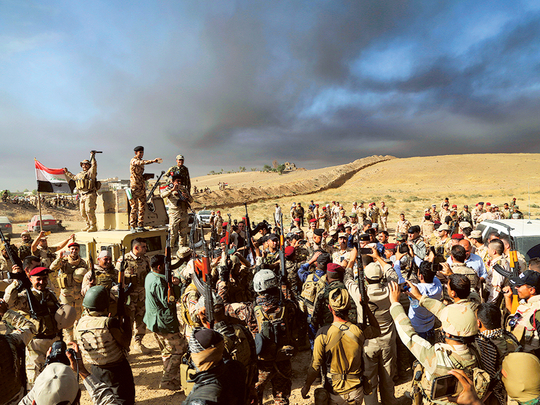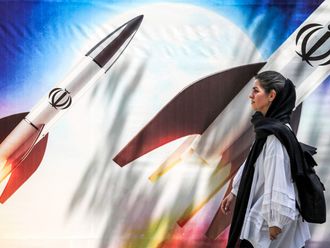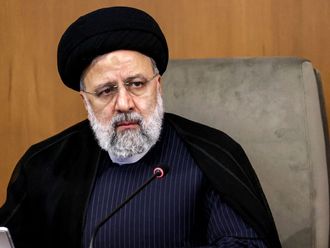
Dubai: Turkey and Iraq have reached an agreement in principle that could eventually allow a Turkish role in the campaign to retake Mosul from Daesh, US Defense Secretary Ash Carter said on Friday after talks with Turkish President Tayyip Erdogan.
Erdogan has previously voiced frustration that Nato member Turkey has not been more involved in the US-backed assault on the Iraqi city, once part of the Ottoman empire and still seen by Turkey as firmly within its sphere of influence.
Iraq, meanwhile, views Turkish military moves on its territory with apprehension and any agreement on Mosul would defuse a major source of tension between the neighbours.
Carter made clear that details on Turkey’s potential role in the unfolding Mosul campaign still needed to be hammered out and a senior US defense official noted non-military assistance was also a possibility.
“That will have to obviously be something that the Iraqi government will need to agree to and I think there’s agreement there in principle,” Carter told reporters travelling with him in Turkey, voicing his own conditional support for some type of Turkish role in Iraq.
“But now we’re down to the practicalities of that ... and that’s what we’re working through.” Turkey has been locked in a row with Iraq’s central government over the presence of Turkish troops at the Bashiqa camp near Mosul, where it has trained thousands of forces.
Erdogan has warned of sectarian bloodshed if the Iraqi army relies on Shi’ite militia fighters to retake the largely Sunni city of Mosul.
The United States wants Turkey to refrain from military operations in Iraq without the green light from Baghdad, fearing the war of words could jeopardise a fragile pact to keep rival sectarian and ethnic militias out of central Mosul.
Carter met with Erdogan, Prime Minister Binali Yildirim, as well as Defence Minister Fikri Isik on a flying visit to Turkey. Ankara is a crucial but sensitive US ally in the fight against the Daesh terror group.
During talks, Carter reaffirmed his support for the strategic alliance between the US and Turkey and vowed Washington would “continue to stand side-by-side with our Nato ally against shared threats”.
The two sides agreed to ramp up joint efforts to deal Daesh terrorists a “lasting defeat,” a Pentagon spokesman said.
Washington is alarmed by tensions between Turkey and Iraq as the long-awaited battle to retake Iraq’s second city Mosul from Daesh terrorists enters a decisive phase.
The US fears the war of words between the two could jeopardise a fragile pact to keep rival sectarian and ethnic militias out of central Mosul.
Respect for Iraq’s sovereignty is an “important principle”, Carter told reporters on his plane en route to Turkey.
A senior US defence official said Washington was urging both sides to “tamp down the rhetoric”.
“We have been talking behind the scenes to get the Iraqis and the Turks to come to an understanding on how to move forward on Mosul and on Turkish presence in Iraq,” the official said on condition of anonymity.
The visit comes as Turkish warplanes carried out deadly strikes on US-backed militias in northern Syria, including Syrian Kurdish fighters.
The Turkish army said Thursday the raids killed between 160 and 200 militants from the People’s Protection Units (YPG), a group considered a “terror” group by Ankara but an effective force by Washington in the fight against Daesh.
Carter declined to comment on the issue during his flight to Turkey.
Turkey in August launched an unprecedented operation in northern Syria, sending tanks and troops to back Syrian rebels who have ousted Daesh from several key areas including Jarabulus and Dabiq. Rebel fighters captured Dabiq on Sunday in a symbolic setback to the terrorists. Carter said the capture of Dabiq was an “important objective” of the campaign.
“The Turks were carrying the burden of the battle here and did spectacularly well,” he said.
“We will be working with them to consolidate that border region, long an objective of theirs and ours, and a very important one in the counter-[Daesh] campaign.”
Tensions between Nato allies Ankara and Washington have grown after the failed July coup in Turkey.
Turkish authorities blamed the putsch on a rogue military group led by US-based Muslim preacher Fethullah Gulen — charges he denies — and they have repeatedly demanded his extradition.
Carter on Friday toured the Turkish parliament that was extensively damaged by air strikes on the coup night.
“(He) expressed his condolences to all those who lost their lives defending Turkey’s democratically-elected government,” said the Pentagon statement.
Carter is due to visit the UAE before a meeting of defence ministers from the international anti-Daesh coalition in Paris on Tuesday. On Wednesday he will join a Nato ministerial gathering in Brussels.
— with inputs from AFP










